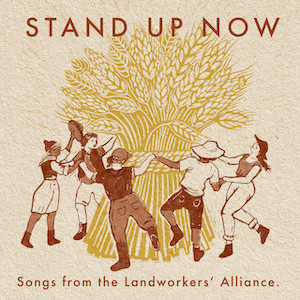
Various – Stand Up Now (Songs from the Landworkers’ Alliance)
Many A Thousand Records – 2021
Traditional folk music has always been a big part of the cultural identity of the Landworkers’ Alliance (a union of farmers, foresters and land-based workers in the UK) and so, this year, they’ve chosen to put together their own collection of folk songs about the land, farming, and the people that hold it all together. There’s a lot of history in these songs and most cover strong political themes, exploring not only the valuable and rewarding nature of a landworkers’ life but also the many struggles they have faced throughout history and continue to face in today’s world.
‘Stand Up Now’ features songs from a variety of folk singers; some are simply landworkers with a song in their back pocket, while others are more well-known, including Nick Hart, Ewan McLennan, and Owen Shiers. Musician and producer Sid Goldsmith travelled across the country, armed with just a simple mobile recording rig, to visit various farms and capture these enchanting songs. What results is one of those wonderful occurrences where every song sounds exactly like the place it was recorded, transporting you to a distinct location and creating a palpable sense of place. Goldsmith also features on the album alongside Jimmy Aldridge on the penultimate song, ‘The World Turned Upside Down’, which tells the story of The Diggers at St. George’s Hill, helped along by the pair’s catchy melodies and jovial vocals.
The album’s opener, ‘Oak and Ash and Thorn’, performed by Maddy Yarwood and Amy Cox, acts as a eulogy to the great trees of this country, exploring the trees’ characters and their role in our culture. The song has a fairly solemn tone, with its slow bass notes and brooding violin, while the vocals flow over the top. This darker feel continues into ‘Sing Ivy’, a near-a capella song that brings to light the harsher aspects of life upon the land, with each verse focusing on a series of impossible tasks, Kerry Ann Jangle and Theo Passingham’s (Young Waters) hypnotic vocals bringing the story to life. The final lines lay bare the grim themes of the song: “my father he worked himself into the ground, I weep as I sow and I plough this old land.”
By contrast, Eggclab 7’s cover of ‘The Lark in the Morning’ brings with it a more upbeat, toe-tapping sound. Still, it makes sure not to lose the intricate song writing of the first two tracks, focusing on the inequalities of our male-dominated world and the struggles women face within it. The song’s final words epitomising these themes: “nothing lives in freedom in a world that’s ruled by blokes.” The percussive guitar work and deep vocals of Ewan McLennan continue the socio-political subject matter with ‘Rufford Park Poachers’, the story of a midnight clash between poachers and keepers that acts as a metaphor for the class struggle of 19th century rural Britain.
This theme of class difference continues into ‘Green Brooms’, a beautifully sung a cappella song from the four-part female group, The Norfolk Broads, which tells the tale of “Lucky Jack,” a fortunate man who marries above his social status. Nick Hart’s plucky guitar notes and shanty-style singing on ‘The Faithful Ploughman’ celebrates the noble virtue of honest work juxtaposed against the greed of big business. This all culminates into ‘We Want the Land’ by Essex-based three-piece folk outfit King Driscolls. The track presents a powerful and energetic call to arms for anyone tired of living in an exploitative world or, as the song says, anyone who just likes “upsetting snobs.”
Owen Shiers, of Cynefin, brings his pulsating guitar rhythms and soothing vocals on ‘Trecadwgan’, which he sings entirely in Welsh. Bernies Yard then presents a rewrite of the late Packie Manus Byrne’s poem on ‘The Drover’s Song’, sung over a droning background tone. Field recordings as a backing to Ed Hamer’s rendition of Matt Armour’s ‘Generations of Change’, exploring the changing work patterns that each new generation brings. Anna O’Neill‘s acoustic notes and hand-tapped percussion emerge on ‘The O’Halleran Sisters’, telling the story of three sisters who battle to resist eviction from a ruthless landlord, acting as a grim reminder that the struggle for decent housing is as old as it is new.
Calming fiddle notes materialise on Robin Grey’s ‘The Ballad of Hawkwood’ bring with them a more positive story of Organiclea CSA, one of the country’s most prominent urban farms, before ‘Hedgerow’ by Polly Gone Wrong, whose a cappella sung vocals encourage you to move through life with respect for nature. The album’s closer, Rita Oldenbourg’s solo vocal rendition of Richard Fariña’s ‘The Quiet Joys of Brotherhood’, emphasises the connectivity of the natural world and the human beings who inhabit it all sharing a common vision of a better world.
Ultimately, ‘Stand Up Now’ is a beautiful and enchanting album that uses its traditional sound to explore a range of political issues surrounding the agricultural industry, whether that’s reminding us of its troubled history or bringing to light pressing issues still prevalent today. While many of the songs on this album include some dark and sorrowful tones, they are ultimately songs about hope; hope for a better, fairer world. As the Landworkers’ Alliance themselves put it: “our countryside is bedevilled with struggle, but a better world is coming, and it’s singing as it comes. They may own the land, but the songs belong to no one…”
Find out more about The Landworkers’ Alliance: https://landworkersalliance.org.uk/our-vision/
Order Stand Up Now here: https://landworkersalliance.org.uk/shop/
